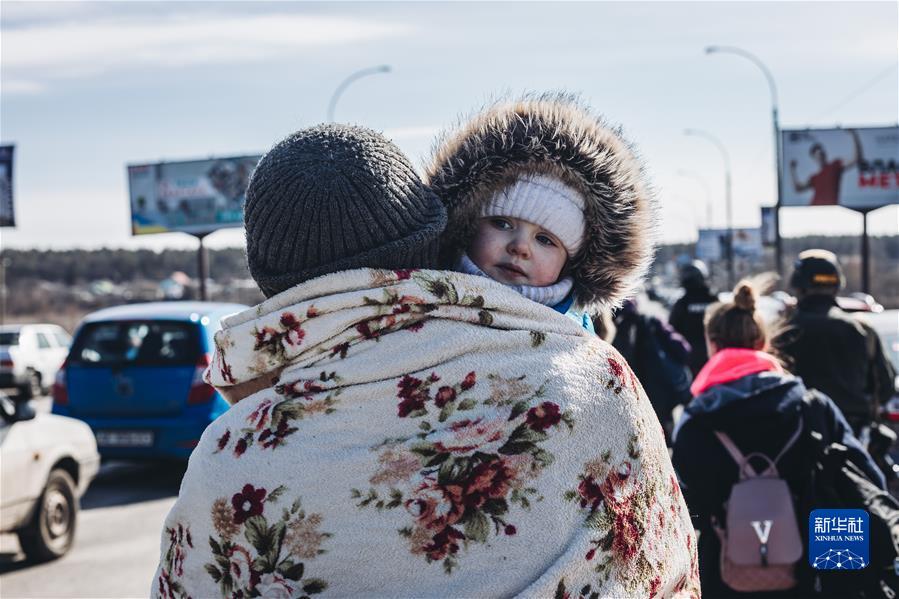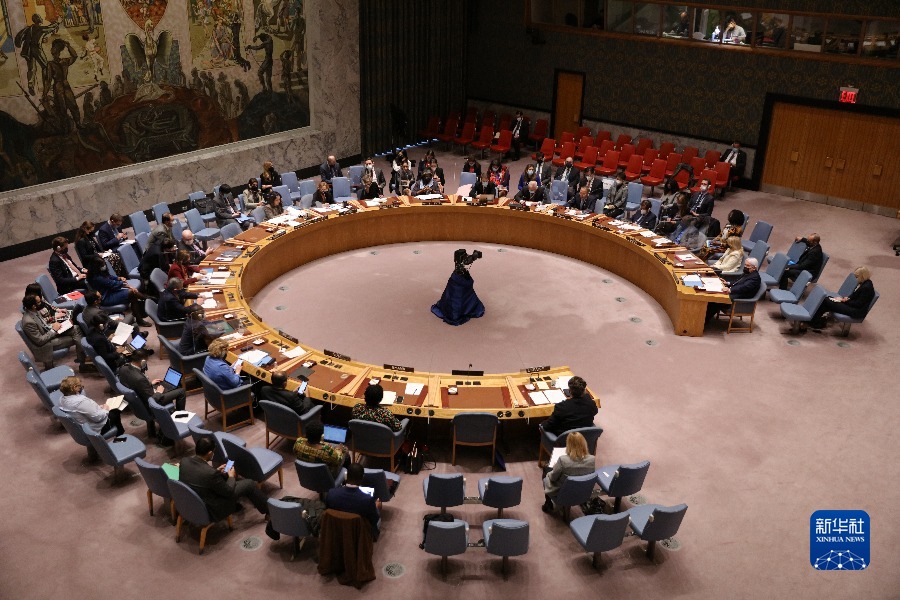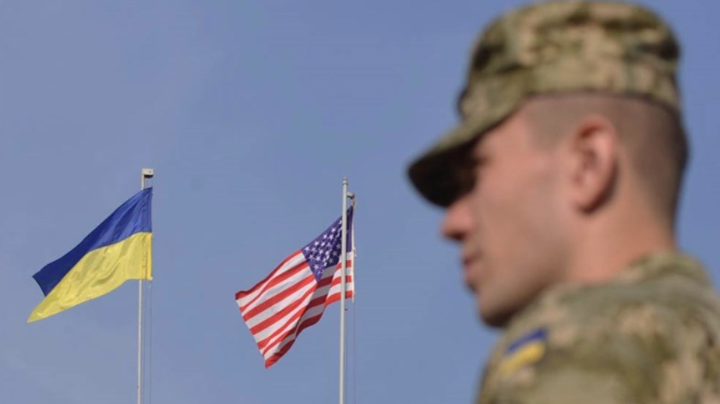Xinhua News Agency, Beijing, March 24th.(International Observation) Russia-Ukraine conflict: the United States is making waves and the world suffers
Xinhua News Agency reporter Huang He Deng Xianlai Li Jizhi
It has been a month since Russia launched a special military operation in Ukraine. Today, the United States has not only failed to take practical measures to ease the situation, but has continued to “fan the flames” through weapons assistance and sanctions.
Analysts pointed out that the continuous eastward expansion of NATO led by the United States is the root cause of the outbreak of the conflict between Russia and Ukraine. In order to maintain its hegemony, the United States does not hesitate to sacrifice the interests of other countries, including its European allies. This practice has long caused dissatisfaction among all parties. To resolve the Ukrainian crisis, the top priority is to promote dialogue and negotiation between the parties. The long-term solution is to abandon the Cold War mentality and build a balanced, effective and sustainable security architecture, so that Europe will be free from war and other regions and countries will not be implicated.
Hegemonic thinking makes waves
On March 23, NATO Secretary-General Stoltenberg attended a press conference in Brussels, Belgium. NATO Secretary-General Stoltenberg said on the 23rd that NATO will significantly increase the number of combat troops deployed on its eastern flank, while reiterating that Ukraine’s entry into NATO is “not on the agenda.”Photo by Xinhua News Agency reporter Zheng Huansong
“The United States and NATO ignore Russia’s concerns. They only care about maintaining hegemony and constantly violate the policy of cooperation with Russia promised after the end of the Cold War.” William Jones, Washington bureau chief of the US “Global Strategic Information” magazine recently He said in an interview with a reporter from Xinhua News Agency.
After the disintegration of the Soviet Union, the United States considered itself the “winner of the Cold War”, and for a long time squeezed Russia’s development space through the eastward expansion of NATO. As a product of the Cold War, NATO did not follow the Cold War into history. Instead, under the leadership of the United States, it has increasingly become a military bloc that engages in camp confrontation. In recent years, NATO has also tried to woo Ukraine to join it, which has touched Russia’s strategic bottom line.
Russian President Vladimir Putin has said many times before that the continued eastward expansion of NATO is unacceptable, but the West has never been able to effectively respond to the “red line” drawn by Russia. In December last year, Russia asked the United States and NATO to make written assurances on security issues. Since then, Russia has conducted intensive dialogues with the United States, NATO and the Organization for Security and Cooperation in Europe on security issues, but has not achieved substantive results.
Analysts pointed out that the United States is the real initiator of the Ukraine crisis. To this day, the United States is still trying to reap economic and political benefits from this crisis. While using the crisis to make a lot of money for its military-industrial complex, it continues to demonize Russia’s security threat to Europe and discourage Europe’s pursuit of strategic independence. pace, thereby consolidating American hegemony.
On the one hand, the Russian-Ukrainian conflict has made the U.S. military-industrial complex prosper. Shares of U.S. military companies have risen sharply recently. Franklin Spinney, a former U.S. Department of Defense official, pointedly pointed out that the U.S. military-industrial complex used this Russian-Ukrainian conflict to exaggerate its fear of Russia, aiming to create an opportunity for a new round of arms spending, and the military-industrial complex will therefore be removed from the Russian-Ukrainian conflict. and other regional conflicts for long-term profit.
On the other hand, the U.S. took advantage of the Ukraine crisis to strengthen its control over Europe on security issues, making it more difficult for Europe to seek strategic autonomy. The French “Echo” recently published an article saying that the Ukraine crisis has shown that Europe is not capable of defending itself alone and still needs the American umbrella.
Many countries in the world suffer
The Ukraine crisis took place in Europe, and European countries bear the brunt of the impact of the crisis. A large number of Ukrainians travel to other European countries, and how to properly handle these people has become a difficult problem for European countries. The Ukraine crisis has a serious impact on global energy and agricultural trade, jeopardizing the global economic recovery. The entire international community has to pay for the conflict provoked by the United States.

People are evacuated through humanitarian corridors in Irpin, Kyiv Oblast, Ukraine, on March 11. Published by Xinhua News Agency (Photo by Diego Herrera)
According to United Nations data, 2.2 million Ukrainian residents have been uprooted since the Russian-Ukrainian conflict, and the number may exceed 4 million in the future. Many of these Ukrainians who have left their homeland go to neighboring European countries. The US “Newsweek” said that such a large-scale population movement has not been seen in Europe since World War II, which may cause serious economic and political problems to the receiving countries. Slovakia, for example, has declared a state of emergency over the influx of Ukrainians.
The energy and food crises triggered by the Ukraine crisis are also a headache for Europe. The EU is heavily dependent on Russian energy. After the West announced sanctions against Russia, energy prices in EU countries continued to rise. Ukraine itself is still the “granary of Europe”, coupled with the driving effect of rising energy prices, European food prices have continued to rise recently.
Jean Pisani-Ferri, a French economist and senior researcher at the Brussels Institute of European and Global Economics, recently wrote an article to estimate the economic losses that the Russian-Ukrainian conflict may cause to the EU. He pointed out that in response to the impact of energy, food and other aspects, the EU’s public expenditure may increase by 175 billion euros this year, which is expected to account for about 1.25% of the EU’s GDP this year. The Ukraine crisis will shape European policy choices for years and decades to come.
The International Monetary Fund believes that unprecedented sanctions against Russia will damage economic and trade cooperation among European countries. At the same time, the entire world will be negatively affected by the Ukraine crisis and sanctions against Russia, which will be reflected in slower economic growth and faster inflation.

A man stands in front of an empty vegetable salad shelf in a supermarket in Cáceres, Spain, on March 23. Rising fuel prices have affected the market supply of some commodities in Spain. Published by Xinhua News Agency (Photo by Gustavo Valente)
Economic experts from many countries have warned that the crisis in Ukraine will increase the prices of commodities such as food and energy, thereby driving up inflation. As the new crown epidemic has not yet ended, this will bring severe challenges to the global economic recovery, especially those developing countries with a single economic structure and a weak economic foundation will feel the spillover effects of the crisis more clearly.
Not afraid of coercion and persuasion
Since the Russia-Ukraine conflict, the United States, based on its deep-rooted Cold War zero-sum mentality and group confrontation, has wooed Europe to impose sanctions on Russia one after another. However, many countries, including China, expressed their opposition to unilateral sanctions and support for Russia and Ukraine to maintain the momentum of peace talks and resolve disputes through dialogue and negotiation.
Chinese State Councilor and Foreign Minister Wang Yi said on the 19th that China has always advocated maintaining peace and opposed war. This is not only rooted in China’s historical and cultural traditions, but also China’s consistent foreign policy. China will continue to make independent judgments based on the merits of the matter and in an objective and fair attitude. China will never accept any external coercion and pressure, and oppose any groundless accusations and suspicions against China.

On March 7, at the UN headquarters in New York, the UN Security Council held a public meeting on the humanitarian issue in Ukraine. Zhang Jun, Permanent Representative of China to the United Nations, attended the meeting and introduced the six-point proposal put forward by State Councilor and Foreign Minister Wang Yi on preventing a large-scale humanitarian crisis in Ukraine. (Photo by Xinhua News Agency reporter Xie E)
Many countries in the world have made it clear that they do not agree with the practice of the United States and other Western countries instigating other countries to impose sanctions on Russia. Since the outbreak of the Russia-Ukraine conflict, the United States has been pressuring India to take a stand, but India has not publicly condemned Russia. Indian Prime Minister Narendra Modi called on the West to support dialogue to resolve the conflict between Russia and Ukraine in a phone call with Putin a few days ago. The Indian side is willing to provide all help to ease the situation in Russia and Ukraine.
In the face of the United States and other Western countries to win over, Pakistan also refused. Pakistani Prime Minister Imran Khan recently slammed foreign forces for trying to put pressure on Pakistan on the Russia-Ukraine issue, saying that Pakistan will continue to make decisions that are in the best interests of the country and its people. He said Pakistan would remain neutral and cooperate with countries committed to ending the Russia-Ukraine conflict.
In the African region, politicians from many countries have long seen through the nature of the United States to coerce other countries, and have all expressed their support for dialogue to resolve conflicts. Egyptian President Sisi said that Egypt supports all diplomatic means to resolve the conflict between Russia and Ukraine, and hopes that the two sides will solve the problem through political channels as soon as possible to avoid further deterioration of the situation. South African President Ramaphosa said that the root cause of the conflict between Russia and Ukraine lies in the eastward expansion of NATO over the years. War and violence will never really solve any problems. South Africa insists that mediation, dialogue and negotiation should be carried out. Ugandan President Museveni said that the Russian-Ukrainian issue exposed the double standard of the West. Zimbabwe’s Ministry of Foreign Affairs and International Trade issued a statement pointing out that Zimbabwe does not support imposing any form of unilateral sanctions on any country over the Ukraine crisis, which violates the UN Charter and unilateral sanctions can never solve any problems.
The US “Boston Globe” website published an article that not the whole world is against Russia. In fact, most of the three continents of Asia, Africa and South America are either still cooperating with Russia or trying to project a neutral image to the outside world. An article on the US “Wall Street Journal” website argues that many non-Western countries do not believe that the West is willing and able to manage the economic impact of the Russian-Ukrainian conflict in a way that safeguards the interests of non-Western countries. (Participating reporters: Yu Rong, Liu Fang)
[Editor in charge: Xu Dan]
